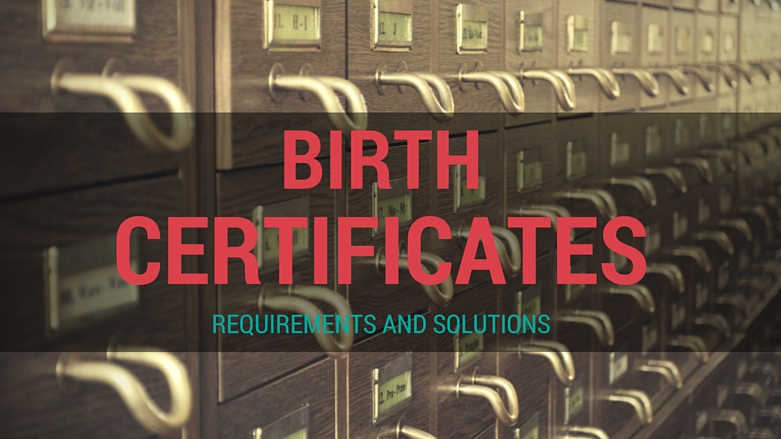

Applicants for U.S. immigration benefits have faced (or will face) at some point in the process the need to provide a birth certificate. Both U.S. Citizenship and Immigration Service (“USCIS”) and the U.S. Department of State (“DOS”) require applicants to submit a birth certificate as part of the permanent residency (green card) process. The availability of a birth certificate and the contents in it vary greatly among countries and also over periods of time. This article aims to document what are the USCIS/DOS requirements with respect to birth certificates and to suggest ways to meet these requirements.
Missing, Incomplete or Inadequate Birth Certificates Require Secondary Evidence
As a general rule, if the USCIS/DOS birth certificate requirements with respect to format and contents are not met, the applicant will be expected to provide secondary evidence of the birth. Often such secondary evidence is in the form of a birth affidavit, as described below, or sometimes by school or hospital records.
What Should Be Included in a Proper Birth Certificate?
Generally, an acceptable birth certificate must be issued by the appropriate local government agency with jurisdiction over the place of birth, be in full-form (and not an excerpt or short-form), and contain the following information about the applicant and his or her parents:
The document must be on proper letterhead and be in original or certified copy. Also, it is important to note that the birth must have been registered with the proper government agency within one year of the date of birth – otherwise, the birth certificate registration will be considered “late.”
When Are Birth Certificate Affidavits Required?
Most commonly, birth certificate affidavits are required in two situations: if the birth certificate is not available or if the birth certificate is available but is incomplete or was registered “late”.
Birth Certificate Not Available
If the local government agency responsible for birth certificates does not have a record of the birth, the applicant will need to obtain a certificate of non-availability (sample) from the agency which confirms that a birth certificate simply does not exist. Then, in addition to this non-availability certificate, the applicant will need to provide two birth certificate affidavits to attest to the birth.
Birth Certificate is Registered Late or is Incomplete
If the birth certificate is available, but if the birth was registered “late” (within more than one year of the date of birth) or if the birth certificate is incomplete (does not include the required information described above), then the applicant will need to include the deficient birth certificate but also provide to USCIS/DOS two birth certificate affidavits.
Requirements for the Birth Certificate Affidavits
The birth certificate affidavits must be provided by people who have first-hand knowledge of the birth. This means that the authors of the affidavits must not only have been alive at the time of the birth but must also have been of an age which allows them to have a recollection of the birth. For example, an affidavit by an older brother who is two years older than the subject will not be very credible. Most often the affidavit of birth is provided by parents, uncles, aunts or older siblings (who are notably older).
The birth certificate affidavits must include certain information:
The affidavit can describe the reason requiring the affidavit to be provided – for example, that it is provided because the birth is registered late or because the birth certificate is not available. All names, especially the name of the applicant, must match other documents used in the application process – passport, petition approvals, visa stamps, etc. Spelling variations should be flagged and addressed to avoid delays due to name discrepancy (see below for “same person” affidavit sample).
Sample Affidavit of Birth
We are happy to provide with a sample affidavit of birth so that our clients and readers and obtain a better idea on how this affidavit should look like. Please note that individual cases may require slightly different formats and/or contents.
Name Discrepancies and Sample “Same Person” Affidavit
Often the name of the applicant is different than the name noted on other key documents such as birth certificate, marriage certificate, passports, etc. Often name discrepancies can easily be explained – for example, in many cases a married name can easily be documented by providing a copy of the marriage certificate. However, often names on birth certificates and other relevant to U.S. immigration documents different significantly and it is a good idea to be proactive and document and explain such name changes.
Abbreviations of names are common in certain countries’ birth or marriage certificates. Similarly, some countries add prefixes or use parents’ names in some (but not all) documents. As a result, sometimes there are notable discrepancies between names on birth certificate, marriage certificate, passports and visas.
To address such discrepancies we recommend applicants obtain affidavit to explain and clearly confirm any name variations, the reasons for such, and confirm that they all refer to the same person. We are happy to provide a sample “same person” affidavit so that our clients and readers and obtain a better idea on how this affidavit should look like. Please note that individual cases may require slightly different formats and/or contents.
Conclusion
We invite you to subscribe to our free weekly immigration newsletter to receive timely updates on this and related topics. We also invite you to contact us if our office can be of any assistance in your immigration matters or you have any questions or comments about the birth documents required for US immigration.